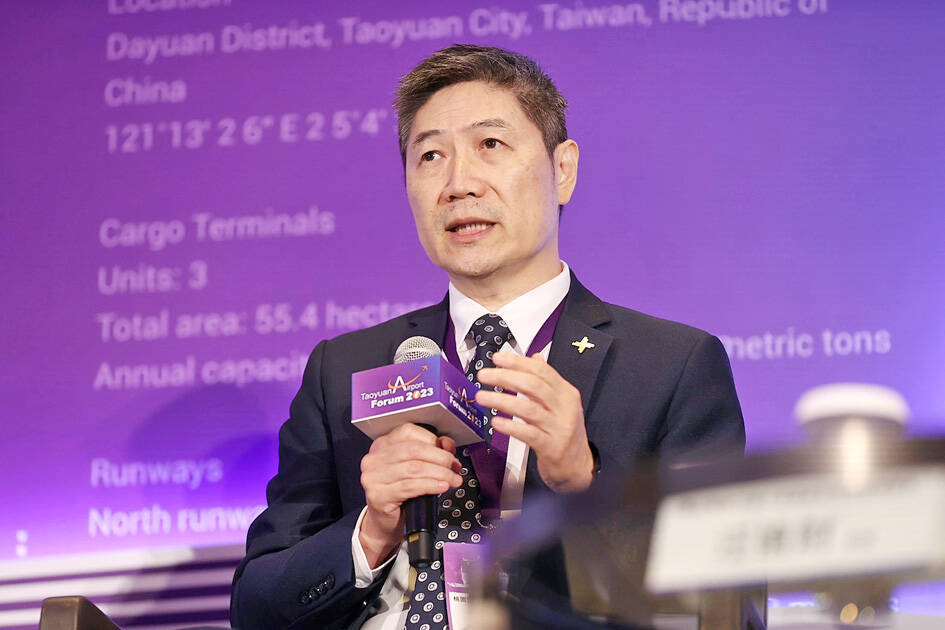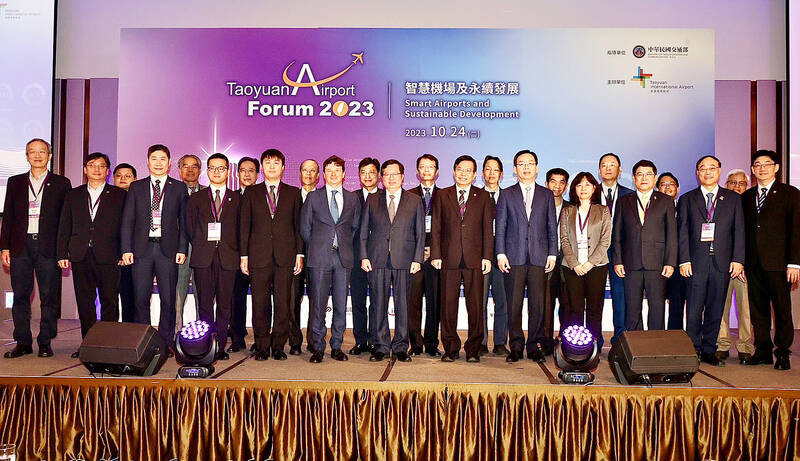Taoyuan International Airport Corp (TIAC) should speed up its recruitment and cultivation of talent and quickly expand the capacity of Taiwan Taoyuan International Airport’s ground transit system to meet increasing service demand brought by an expected increase in passenger numbers in the next few years, aviation experts said on Tuesday at a forum organized by the airport operator.
The experts called for immediate action after the state-run company projected that the number of passengers accessing Taoyuan airport this year could exceed 30 million by the end of next month. That would be about 70 percent of the number recorded in 2019.
The Ministry of Transportation and Communications said that the airport’s service capacity would expand from 37 million passengers per year to 82 million after its third terminal and third runway are competed in 2026 and 2030 respectively.

Photo courtesy of Taoyuan International Airport Corp
While the Taoyuan Airport Forum focused on the use of smart technology and sustainable development at the airport, it also addressed challenges and opportunities for a future airport, as well as issues arising from innovative passenger services.
Civil Aviation Administration Director-General Lin Kuo-shian (林國顯) said that the number of passengers accessing Taoyuan airport plunged from 48.69 million in 2019 to 5.34 million in 2020, 908,000 in 2021 and 7.3 million last year.
“This year, we should be coming out of a curve to reach 30 million,” Lin said.

Photo courtesy of Taoyuan International Airport Corp
Wong Jinn-tsai (汪進財), a transportation and logistics professor at National Yang Ming Chiao Tung University, said that TIAC should ensure that Taoyuan airport’s ground transit system has capacity for 82 million passengers.
“During peak hours, you cannot even find a seat on the Taoyuan airport MRT line. Instead of asking everybody to drive, which is not a sustainable move, the airport company should consider working with carpooling service providers,” Wong said.
Chunghwa Airport Council chairman Yin Cheng-pong (尹承蓬) said that TIAC has 600 employees, only half the number in some benchmark airports.
However, the company’s employees are expected to have the same workload as those at benchmark airports, Yin said.
To meet future challenges, the airport should organize exchanges with other hub airports in Asia and use resources from Airports Council International to train its employees, Yin said.
Taoyuan International Airport Corp CEO Fan Hsiao-lun (范孝倫) said that the company must address the issues of sustainability and green energy as they are irreversible trends.
The company has experimented with the use of self-driving cars at the airport, but increasing the use of sustainable aviation fuel needs cross-departmental cooperation, Fan said.
“We pay NT$50 million [US$1.55 million] per month for the electricity used in Terminals 1 and 2, so we have to start thinking about solar energy and other options for green power... People are worried that the flares caused by solar panels could affect aviation safety, but the problem can be solved with the advancement of modern technology,” he said.
Chaoyang University of Technology associate professor Lu Yen-liang (盧衍良) said airlines managed to survive during the COVID-19 pandemic because of their booming air cargo businesses.
However, unlike passenger servics, airlines are not required to pay Taoyuan airport a cargo service charge, Lu said.
Given that the company has listed a series of initiatives to make Taoyuan airport a smart and sustainable airport, it needs to reconsider the tariffs it charges airlines and whether they would cover funding for the initiatives, Lu said.
Lu also urged TIAC to offer services that would attract more air travelers to transfer in Taiwan.
(Taoyuan International Airport special report)

‘DENIAL DEFENSE’: The US would increase its military presence with uncrewed ships, and submarines, while boosting defense in the Indo-Pacific, a Pete Hegseth memo said The US is reorienting its military strategy to focus primarily on deterring a potential Chinese invasion of Taiwan, a memo signed by US Secretary of Defense Pete Hegseth showed. The memo also called on Taiwan to increase its defense spending. The document, known as the “Interim National Defense Strategic Guidance,” was distributed this month and detailed the national defense plans of US President Donald Trump’s administration, an article in the Washington Post said on Saturday. It outlines how the US can prepare for a potential war with China and defend itself from threats in the “near abroad,” including Greenland and the Panama

A wild live dugong was found in Taiwan for the first time in 88 years, after it was accidentally caught by a fisher’s net on Tuesday in Yilan County’s Fenniaolin (粉鳥林). This is the first sighting of the species in Taiwan since 1937, having already been considered “extinct” in the country and considered as “vulnerable” by the International Union for Conservation of Nature. A fisher surnamed Chen (陳) went to Fenniaolin to collect the fish in his netting, but instead caught a 3m long, 500kg dugong. The fisher released the animal back into the wild, not realizing it was an endangered species at

The Chinese Nationalist Party (KMT) is maintaining close ties with Beijing, the Democratic Progressive Party (DPP) said yesterday, hours after a new round of Chinese military drills in the Taiwan Strait began. Political parties in a democracy have a responsibility to be loyal to the nation and defend its sovereignty, DPP spokesman Justin Wu (吳崢) told a news conference in Taipei. His comments came hours after Beijing announced via Chinese state media that the Chinese People’s Liberation Army’s Eastern Theater Command was holding large-scale drills simulating a multi-pronged attack on Taiwan. Contrary to the KMT’s claims that it is staunchly anti-communist, KMT Deputy

The High Prosecutors’ Office yesterday withdrew an appeal against the acquittal of a former bank manager 22 years after his death, marking Taiwan’s first instance of prosecutors rendering posthumous justice to a wrongfully convicted defendant. Chu Ching-en (諸慶恩) — formerly a manager at the Taipei branch of BNP Paribas — was in 1999 accused by Weng Mao-chung (翁茂鍾), then-president of Chia Her Industrial Co, of forging a request for a fixed deposit of US$10 million by I-Hwa Industrial Co, a subsidiary of Chia Her, which was used as collateral. Chu was ruled not guilty in the first trial, but was found guilty